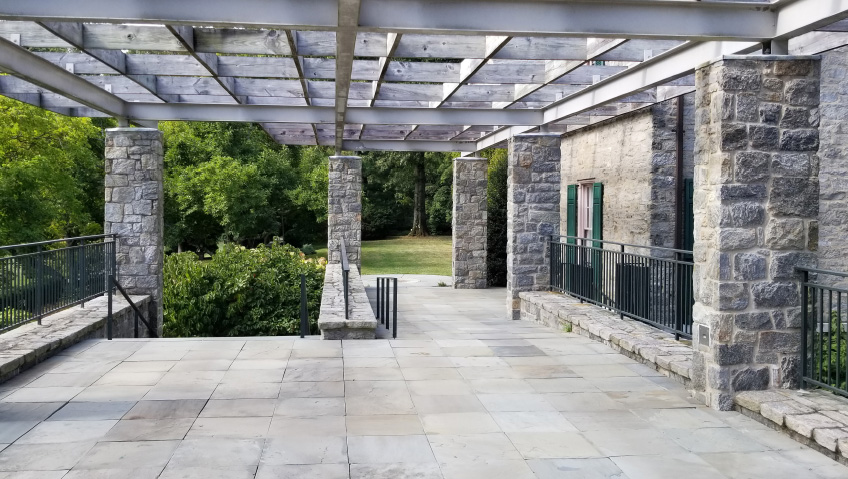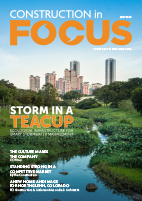Contrary to contemporary wisdom that preaches finding riches in the niches, Nelson + Pope has turned “niching-down” across a wide range of services into a sustainable and rather fine art. To say this is bucking the trend, in a sector where it’s tricky finding companies with well-honed skills in many areas, is to say the least.
Driven by overall property performance as its chief design outcome—rather than focusing on building performance alone—the team is guided by a simple, principal question when it works on integrated site and building projects. How can the client be assured of a sustainable development? This holistic approach to project design informs all planning, from the big picture down to the smallest details. This means providing clients, from land developers to building owners, with everything from environmentally responsible lighting controls and wall finishes to sophisticated upholstery fabrics.
Thinking it through
Located in Melville, New York, with a satellite office in Manhattan, this full-service architectural, engineering, and surveying leader has served customers from Montauk to New York and beyond into eastern Pennsylvania and the Hudson Valley for nearly seven decades. Today, the spirited members of the Nelson + Pope team have a “ground-up” habit of thinking things through from the moment they start all the way to project delivery.
Nelson + Pope serves a diverse array of customers across both the private and public sectors, and also works on federal infrastructure. “We’re diversified not only in our services but also in our client base. We’re trying to provide every service to every range of clients we can find,” says John Perrotta, Partner and head of the mechanical engineering department.
As a result, its teams are exposed to a vast and diverse range of work, which in turn gives them a wide frame of reference that informs and guides their design choices and decisions, benefiting customers in multiple ways.
Because the company invests in a large team of seasoned experts passing on their industry experience to younger professionals, it’s preserving and sharing generational knowledge in the best way possible—on the job. That means that Nelson + Pope (established in 1954) can realistically call itself the home of next-generation design built on decades’ worth of hard-won experience.
“Within each department is a carefully crafted organizational structure—a tiered system, if you will. As a result, there’s a high level of collaboration within each department,” says Perrotta.
Nelson + Pope evolved around providing clients with the best experience possible, and services were briskly added and integrated as the need for them arose. Beginning as a land developer doing surveys, roadway design, sanitation design and similar, the company expanded into architecture, also adding mechanical, electrical, and plumbing engineering services. As part of its commitment to making collaboration easy and pain-free for customers, the company provides project owners with a single point of contact.
Accessing expertise
Clients benefit from easy access to the company’s environmental planning affiliate, Nelson Pope Voorhis (NPV). This environmental, land use, planning, and economic consulting firm opened its doors in 1997, supporting Nelson + Pope in complex planning, zoning and environmental analyses, and resource assessments and management.
NPV also serves the public, private, retail, institutional, and government sectors with environmental planning services from its offices in Melville, Long Island and Suffern, New York. The NPV team takes care of planning, environmental testing, permitting, landscape architecture, and environmental assessments, working intensively on the sustainability of projects, including landscaping. The team is also responsible for restoration of the property post-construction. Apart from ecological and ergonomic considerations, its buildings are typically positioned to make economic sense, yet always in a way that makes the least impact on the environment.
On approval of a project, all departments commence work on their contribution to the final product. Each department is headed by an experienced professional in the field. Having everyone in the same building allows for easy collaboration and means every aspect of each project dovetails smoothly into the next, giving customers seamless access to information.
Some of NPV’s customers are municipalities needing to improve the quality of water resources in and around entire service regions like villages or towns. The team not only helps municipalities develop ideas for the future of their properties but also guides them through finding grants and applying for funding.
“We look at their properties as a whole. We evaluate what they have as options. We then get into looking for where the great opportunities are. In a company version, we go out and look at how we do a master plan for the entire property to make it a good, sustainable property,” says Rusty Schmidt, Senior Landscape Ecologist.
Future-proof
Design is always informed by the future and people’s needs within the context of that projected future. “Energy efficiency and occupant comfort is what drives our design, whether it’s new construction or renovation,” says Michael Sciara, RA, Senior Partner and head of the architectural department.
“An interesting question that arises when looking at these aspects of comfort within an energy-efficient building is lighting control.” Considering that every client looks for some level of cost savings on the capital outlay, optimizing performance is paramount to selling these concepts.
“We’re trying to wring every bit of energy efficiency we can out of a building. How do you make sure the lights are only on—and only on enough—when somebody’s in a room? And light is necessary,” Sciara continues, underscoring the importance of daylight harvesting systems and occupant controls in such energy-efficient buildings. “It’s not just LED lights; it’s about making sure that lights are only on when they’re absolutely necessary.”
The company is also well-versed in decarbonizing buildings through fuel conversions, such as moving them from natural gas and oil consumption to all-electric heat pumps, bringing down operating costs and reducing the use of fossil fuels.
Nature by design
Reflecting its goal of achieving the highest level of environmental responsibility and resource efficiency possible, the company also creates high-performance, low-maintenance garden spaces.
Investing in native flora that will flourish within the natural rainfall profile of the area, the team does its bit to encourage the presence of native flora and fauna. Its designers work to the rhythms and provision of nature rather than to imported ideas of status and beauty. “If an irrigation system is required, it’s a smart system that only turns on when the plants need it,” Schmidt says. By not having watering systems on set schedules, green spaces use far less water and energy to thrive.
NPV’s designers take particular cognizance of the shape and character of the native plants they use in the landscapes that frame its buildings. Plants that do not need maintenance through pruning or any other form of manicuring present minimum cost. They also tend to live longer. Schmidt points out that it’s rare to find people who fully understand how to manage these modern, eco-efficient properties, as most people are so schooled in outdated ideas about landscaping that education is imperative if care and maintenance are to run smoothly.
Customers, the best marketing
The company’s devotion to its customers is reflected in the return customers and referrals Nelson + Pope gets from its clients, with the result that the company has never had to market itself.
That continues, even in economically tough times. During COVID-19, the company grew so much that it had to move premises, bringing its teams a much better-appointed new workspace. Now, as staff numbers continue to escalate in response to new clients and projects, its rapid growth has the company leadership wondering whether it shouldn’t have gone for even bigger premises.
In the team are people in their seventies and youngsters in their first position. Culturally, there is a good level of diversity too, and the company has a high proportion of women in its teams.
“We have more diversity in our office than many around. In the time I’ve been here, it has improved. It just doesn’t matter who you are; as long as you bring the skill set to the job, that’s the most important thing,” says Perrotta.
Prestige projects
There are scores of projects that do the affiliated companies proud. One of the larger projects was the architecture, interior design, and mechanical, electrical, and plumbing engineering of the New North Shore Company 2 Fire House in Rocky Point, New York.
Multiple interior offices and amenities including a community meeting hall, recreation room, sleeping quarters, and training rooms stretch across the beautiful 11,000-square-foot facility with its stone floors complimented by timeless wood wainscoting and crown molding. Here, the company was responsible for a large range of activities like topographic survey and mapping, preliminary and final designs, plans and specifications, soil borings, landscape architecture, construction oversight, and so on.
The replacement of an HVAC system at New York’s Southampton Town Hall was also key. Town Hall, a former school building, was previously tethered to a steam supply from an adjacent schoolhouse. The company developed a streamlined solution that gave Town Hall an independent HVAC system, a 130-ton variable refrigerant-flow air-source heat pump system with heat recovery that ensures an even temperature throughout the building. The system comes complete with a custom-designed 600-amp, 480-volt electrical service, single room controls, and overall full building control for ambient comfort in every season. An outdoor air system also distributes fresh air throughout the building, ensuring good indoor air quality.
Another project that stands out for NPV is a landscape master plan comprising sustainable landscapes complete with ecological wetlands, created for the 200-acre campus of the Sisters of St. Joseph in Brentwood, New York. Since adoption of the plan in 2018, NPV has been working with the Sisters on implementing various elements of the master plan, including installation of multiple green infrastructure / stormwater management projects, installation of a four-acre solar array with specifically designed native pollinator habitat, management of Southern Pine Beetle infestation, and installation of a large native meadow.
The client’s objective was to create a space not only supportive to the growth of the parish but also to reflect the church’s progressive view on land preservation, management, and diversity, embodying its Land Ethic Statement. The team collaborated with the Sisters and the Peconic Land Trust to bring into being a verdant sanctuary conducive to peaceful spiritual reflection and sustainable activities like gardening; to develop good quality water infrastructure; and to protect and restore the site’s sensitive historic and natural heritage areas.
As part of the solar array project, Schmidt ran a complete wildlife survey and ecological monitoring. While taking care of the native plantings around the solar panels, establishing and maintaining the presence of pollinator populations, especially bees and butterflies, was at the heart of the study and was made possible by the Nature Conservancy.
As industrial shipping grows in tandem with online shopping, the company has also seen a sharp rise in the building of warehousing facilities, fulfillment centers, trucking terminals, and similar logistics facilities. But that does not mean that old-fashioned retail is standing still, the company leaders point out.
On the contrary, they’re seeing a significant increase in demand in the retail sector. “We have a tremendous amount of brick-and-mortar retail work. And there’s a lot of shopping center rehabilitation, a lot of new construction and renovation. Those retail property owners are doing what they can to draw customers back to the local shops,” says Sciara.
With this continued drive toward economic expansion, Nelson + Pope’s customers are no doubt poised to keep this industry leader even busier than usual. We look forward to seeing what the future brings.






